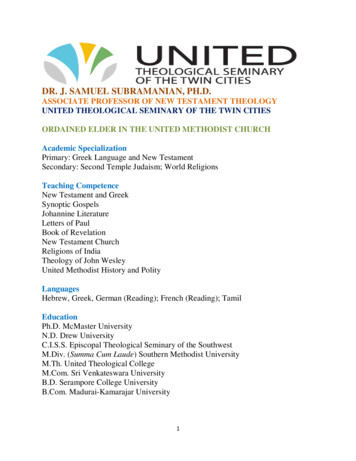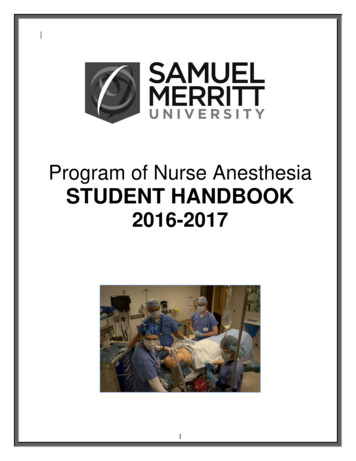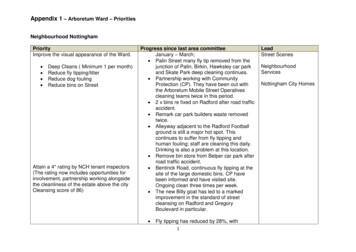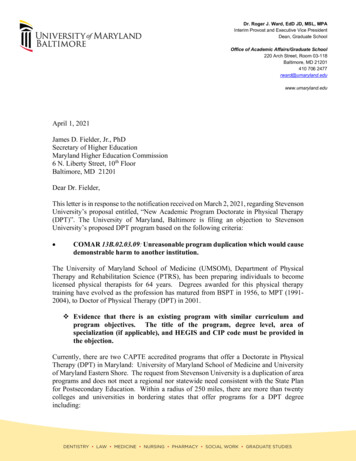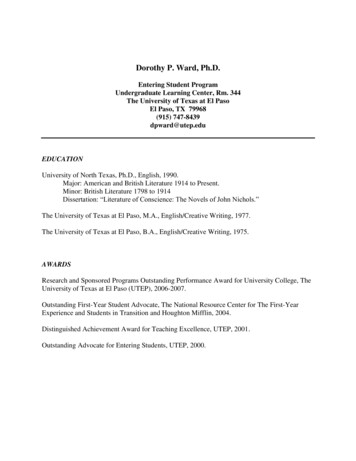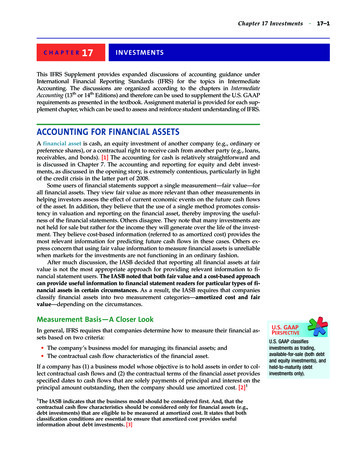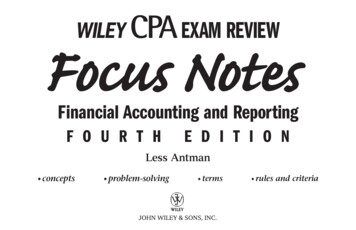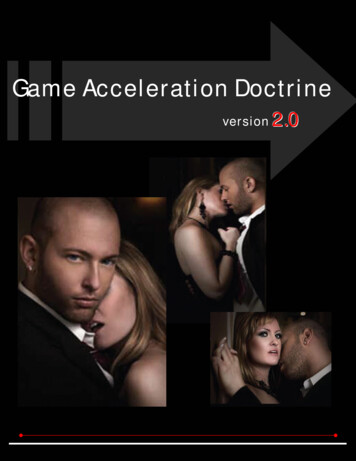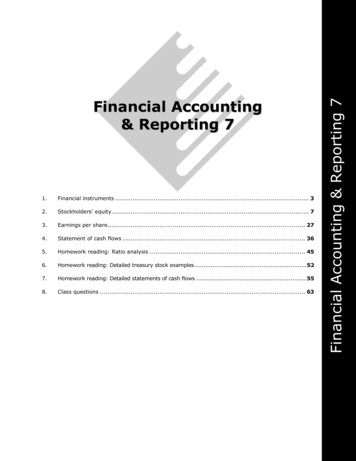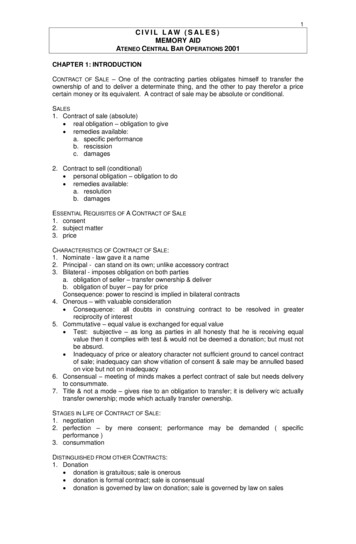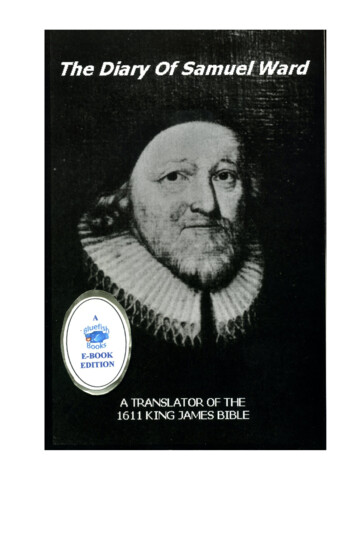
Transcription
THE DIARY OF SAMUEL WARD,A TRANSLATOR OF THE 1611 KING JAMES BIBLETranscribed and preparedbyDr. M.M. Knappen,Professor of English History,University of Chicago.EditedbyJohn W. CowartBluefish BooksCowart CommunicationsJacksonville, Floridawww.bluefishbooks.info
THE DIARY OF SAMUEL WARD, ATRANSLATOR OF THE 1611 KING JAMESBIBLE. Copyright 2007 by John W. Cowart. Allrights reserved. Printed in the United States ofAmerica by Lulu Press. Apart from reasonable fairuse practices, no part of this book’s text may be usedor reproduced in any manner whatsoever withoutwritten permission from the publisher except in thecase of brief quotations embodied in critical articlesor reviews. For information address Bluefish Books,2805 Ernest St., Jacksonville, Florida, 32205.LibraryofCongressCataloging-inPublication Data has been applied for. Lulu Press #1009823.Bluefish BooksCowart CommunicationsJacksonville, Floridawww.bluefishbooks.info
SAMUEL WARD1572 — 1643
CONTENTSINTRODUCTION . .1THE TWO SAMUEL WARDS . . 13SAMUEL WARD’S LISTIING IN THEDICTIONARY OF NATIONAL BIOGRAPHY . . 17DR. M.M. KNAPPEN’S PREFACE . . 21THE PURITAN CHARACTER IN THE DIARY. . 27DR. KNAPPEN’S LIFE OF SAMUEL WARD . . 43THE DIARY TEXT . 59THE 1611 TRANSLATORS’ DEDICATIONTO THE KING . 97
THE 1611 TRANSLATORS’ PREFACE TOBIBLE READERS . . 101BIBLIOGRAPHY . .129
INTRODUCTIONbyJohn W. CowartSamuel Ward, a moderate Puritan minister, lived from 1572 to1643. His life spanned from the reign of Britain’s QueenElizabeth, through that of King James. and into the days of Charles I.Surviving pages of Ward’s dated diary entries run from May11, 1595, to July 1, 1632.During much of her reign, the Virgin Queen manipulatedreligious factions in her realm by threatening to marry a Catholic —or not. Her appointed bishops threatened to defrock all Puritans whorefuse to wear the mandated ecclesiastical gowns — a burr ofcontention often mentioned in Ward’s diary.Another source of tension between the Puritans and theestablished church involved which Bible to use. The queen andbishops favored the Bishops’ Bible which she had translated in 1569.The Puritans, Reformers, Presbyterians, and Separatistsfavored the Geneva Bible published in 1560. It was the first Bible tocontain verse numbers so readers could easily locate specificScriptures.However it also contained Calvinist marginal notes whichestablished church officials felt inflammatory.
2Feelings ran high on the matter.On March 24, 1603, King James ascended to the throne. Thevery next year, he convened the Hampton Court Conference to ironout differences between religious factions in his new kingdom. Oneresult of that conference was the commissioning of a new translationof the Bible, the Authorized Version or King James Bible.Working in six committees, 47 scholars from the University ofCambridge, the University of Oxford, and from Westminster Abbyundertook the translation.Each scholar worked independently, without pay, then eachcommittee reviewed, revised, harmonized, and standardized theirwork.Samuel Ward served on the translation committee of theSecond Cambridge Company which was comprised of the finestbiblical and linguistic scholars of the day.In January, 1609, the General Committee Of Review met atStationer’s Hall, London, to review the complete work of the sixcompanies. Publisher Robert Barker issued the first printing of theKing James Bible as a folio edition in 1611. Each page was printed ona cotton sheet measuring 16 ½ by 10 ½ inches. A bound copy cost 12shillings.The translators dedicated the volumn “To The Most High AndMighty Prince James, By The Grace Of God, King Of Great Britain,France, and Ireland, Defender Of The Faith, &c.”They wrote a Preface To Readers outlining the reasons thistranslation improved on former ones. Their Preface details theirhistory, methods and sources. It explaines the principles guiding theirwork and how they built on former English translations.“Truly (good Christian Reader),” they wrote, “Wee neverthought from the beginning, that we should neede to make a newTranslation, nor yet to make of a bad one a good one but to make agood one better, or out of many good ones, one principall good one,not justly to be excepted against; that hath bene our indeavour, that ourmarke”.A copy of this Preface, broken into shorter paragraphs foreasier reading, follows the text of Ward’s Diary in this book.
3In 1569 the portrait of Queen Elizabeth I appearedon the title page of the Bishops’ Bible.
4Puritans favored the Geneva Bible with its“Moste profitable annotations”.
5Title Page of the 1611 King James Bible
6Yet having an authorized version of the Bible did not resolvedifferences among English Christians. This 1641 handbill shows howthe established church regarded Reformers and Puritans:Samuel Ward tried to walk a thin line between Puritan andEstablished Church factions. While perusing his academic career atCambridge, he preached solid Puritan sermons, yet rose to become theroyal chaplain for King James, head of the Established Church.Although during Elizabeth’s reign England had repelled theSpanish Armada, and although the Catholic Gunpowder Plotattempted to assassinate King James, he sought peace with CatholicSpain. He send Charles, the crown prince, to the Spanish court toarrange a marriage with a Spanish princess. This developmenthorrified English Puritans but that marriage fell through.Charles married Princess Henrietta Maria of France, aCatholic, in 1625; his own subjects beheaded him in 1649.Samuel Ward’s diary reveals that while he cared deeply aboutlarger academic, political and church polity matters, his main concernwas his own walk with Christ.He writes to remind himself of his daily sins and faults — andto remember God’s blessings to him. The twin themes of this diaryare repentance and thankfulness.
7This book draws heavily from the scholarly work of Dr.Marshall Mason Knappen, assistant professor of English History atthe University of Chicago.Dr. Knappen transcribed the original text, researched extensivefootnotes, wrote an introduction, drafted a biography of Rogers, andpublished the text in 1933. His work, Two Elizabethan PuritanDiaries, forms the basis of this present edition.My role in presenting this edition is one of rendering itreadable and available to modern readers.In his zeal for preserving the text for researchers, Dr. Knappenretained Rogers’ 16th Century spelling, abbreviations, capitalization,and punctuation. He inserted diacritical indicators on every page.While these tools may prove invaluable to the scholar, theydistract me in my own reading of the diary for its spiritual inspiration.So many words have changed spelling since 1587 that as Ientered these diaries in Word on my computer, Clippie, that littletalking paperclip man on the Help menu, pops out and says, “There aretoo many spelling and grammatical errors in WardDiary.doc tocontinue displaying them. To check the spelling and grammar of thisdocument, chose Spelling and Grammar from the TOOLS menu”.For instance Here are the opening paragraphs of Ward’s diary:Prid, Desir of vaynglory, yea, in little things. Wearisomnesin Godes service. Non affection. No delite in Godes service. Nocare of exhorting my brethren. Non boldnes in the professing ofGodes name. No delite in hearing Godes word, or in prayer, or inreceyving of the Sacramentes. Shame in serving God.May 11, 1595. Thy dulness in the morning in prayer. Thylittle affection in hearing Mr. Chattertons1 good sermon upon the 34verse of the 25 of Math. Thy adulterous thoughtes that day. Thybackwardnes in calling to mind the sermons that day. Thybackwardnes in exhorting S[ir] S[harp], 2 neverthelesse the good1Laurence Chatterton or Chaderton, formerly a fellow of Christ's, but atthis time Master of Emmanuel College. His wife was a sister of the EzekielCulverwel who is mentioned in the Rogers diary. See DNB.2Ward's roommate, Isaac Sharp, later rector of Thorpe-juxta-Newark,Notts.
8motions of Godes spiritt in thy mynd. Thy anger against M[r.]N[ewhouse]3 for his long prayers.May 12, 1595. My evil thoughts of M[r.] N[ewhouse] when Iheard him beginning to expound a place in Ecclesiastes. Mynegligence in not comming to prayers, and my little care for thesame. Think if thou were in Turky, thou would be glad to have themto pray with, as little account as thou now makest thereof.May 13, 1595. My little pity of the boy who was whipt in thehall.4 My desire of preferment over much. My adulterous dream.Yes, words change and new ones appear even today.Why, when a young lady offered to show me her bling, I got allexcited till I found out she was showing nothing but a stupid charmbracelet!So I am updating Ward’s Elizabethan vernacular as best I can.I hope to make these diary pages readable for people todaybecause they show the writer’s walk with Christ; therefore, they helpme in my own walk. Few books help me more than the diaries,journals, and blogs of other Christians. And when I read my owndiaries from years past, they help me live my life today a little better.Seeing where I’ve been helps me see where I’m going.Apparently Samuel Ward enjoyed that same experience.A word needs to be said about how Ward used the possessive;instead of the apostrophe S familiar today, (Joe’s dog), Ward used theconstruction of a man’s name followed by “his whatever” (Joe hisdog). Thus we read “Mr. Latham his death” or “Mr. Dickinson hiswife”. For the most part, I have retained this construction as well asWard’s phonetic spellings when the meaning is clear.Although I have kept some of Ward’s linguistic features toretain the flavor of the original, take a look at a list of common words3Thomas Newhouse, Ward's tutor. "Suspected of Puritanism"; fellow ofChrist's 1594-99; later minister at St. Andrew's, Norwich.4It was customary to punish the younger members of the collegecorporally. The older ones were fined (Masson I, 135).
9used in the diary and you’ll see why I felt the necessity of updating forreadability:A word such as abhominacion easily translate intoabomination. Other words do not lend themselves as readily; whenthe minister says he went to a meeting for Prechinge and Praier, Ihave to stop reading and interpret those words into preaching andprayer.Sometimes simpler words have been harder for me to figureout. Depending on the context, the word of can mean either of, or off,or often.One word in the diary I had to watch for all the time is theword then. Sometimes that word means the same as it does today, asin the sentence: “I went to Wal-Mart, then to the dentist to have all myteeth pulled”.Other times the word then means than, as in the sentence, “Ihave more than ten books”.Stumbling over then used as than or then confused me until Irealized that in everyday Elizabethan English, diarists often spelledthings just as they pronounced them. And if I say the sentence I’mediting out loud, the meaning in context becomes clear because as Ilisten to what I actually say, I find that I pronounce the word the sameway the diarists did!Unless in print, or spoken by someone who enunciates clearly,practically everyone here in the South today says, “I have more thenten books”. Yes, we Crackers pronounce many words just as theElizabethan Puritans did. Here is a list of some words I have updated:Allwaies alwaysAclock O’clockAgaynst againstAnotheres another’sAtt atAyre air
10Bene beenBenummed numbBycause becauseChappell chapelColledge collegeComming comingDeutyes dutiesEsteme thinkFaythe faithFlegmaticke phlegmaticGoo goGoyng goingHartely hardilyHearbes herbsIniust unjustInough enoughInterteyned entertainedLets hindrancesManciple cookMayre marryMundayes MondayMotyve motiveMynd mindMyne mineOn inPhysic study medicinePraevayling prevailingPrayse praise
11Puples - pupilsPrimities priorityRed readSizing food portionsSlubber mutterSoveraigne SovereignStraungers strangersTearme termTher theirThow thouThorow throughTrew trueTropickes tropicsTeeks tricksUprore uproarWamble an upset stomachWer wereYow youYtt it
I first read this book for my own edification, to let this focusedman’s thoughts from long ago nudge me closer to Christ in my ownlife today.Since the Diary Of Samuel Ward helps me in that way, I thinkit only proper to preserve his words as best I can to help some otherstruggling reader in the future.—— John Cowartwww.cowart.infoA Page, from Ward’s Section of the King James Bible
Romans Chapter One, KJV
IMPORTANT NOTE:The Two Samuel WardsByJohn CowartWhen I first began to prepare this manuscript for publication, Imade a crucial mistake which I have, to the best of my ability,corrected in the present pagesMy own diary entry for Friday, July 27, 2007, best explains:Double Trouble With Samuel Ward:The Titanic embarks on her maiden voyageSamuel Ward was a Puritan.Samuel Ward was a Puritan.Samuel Ward was a preacher.Samuel Ward was a preacher.
15Samuel Ward was an author.Samuel Ward was an author.Samuel Ward was a fellow of Sidney Sussex College,Cambridge.Samuel Ward was a fellow of Sidney Sussex College,Cambridge.Samuel Ward lived during the later part of the 16th Century andthe early years of the 17th Century.Samuel Ward lived during the later part of the 16th Century andthe early years of the 17th Century.The first time I ever heard of Samuel Ward was last December. .The first time I ever heard of Samuel Ward was yesterday.Yes, as I proofread my sample copy of A Zealous Heart: TheDiary of Samuel Ward — you know, the book I wrote about editing onWednesday — the same book I have written about in 31 blogpostings since last December — the same book I struggled with overall those Greek quotations Yeah, that book.As I used my magnifying glass to check out a footnote reference Iread this phrase: “by his namesake of Ipswich”.Samuel Ward lived between 1577 and 1639 — Samuel Wardlived between 1572 and 1643.You got it!There were two contemporary Puritan preachers — each namedSamuel Ward!And I did not realize that until yesterday!Since last December I have worked preparing the diary of one ofthem, the one from Sidney Sussex College, Cambridge, (Yeah, him)and writing a biography of the man (men) to accompany the 16thCentury text of his diary.In ignorance I combined the two men and incidents from theirlives into one fictional Samuel Ward. I did not realize I was dealingwith material from two separate lives.Oh, there was one subtle hint when there in 1621, when SamuelWard was in trouble with both the Royalists and with the Roundheadsand I wondered why each of the opposing parties had it in for him.Well, turns out one Samuel Ward favored the Royalists; the otherfavored the Roundheads.
16I just missed that hint, and blithely went on my way combiningquotes and character traits and incidents from the lives of the two menand presenting them as one person.What to do? What to do?I mean, I’d scheduled this book to go to press this comingweekend. I sank seven months of long days and eye-strain nights intopreparing it. The book cover is resized and ready. The promo materialwritten. PDF files converted.Change a comma here and there and the book is read to sell.Right? Right?Wrong! Wrong!Discovering there were two Wards, stunned me.All that time, all that research, all that anguish over Greekphrases, all that eye-strain, all that work — all for nothing. Wasted.Pissing against the wind.Then came the insidious thought: Who’ll know the difference?How many people in the world will realize that I’ve combined two meninto one. I mean, there is not Samuel Ward fan club out there. His isnot a household name. Hardly anyone will know the difference if I let itslide. Publish the book and move on. Why not?Integrity.How can I claim to be a Christian wanting to be (at times) 100%at the disposal of Jesus Christ if I knowingly publish a book which Iknow is factually wrong?Ridicule.If I publish this amalgamation then I’d be the laughingstock of thewhole world, of everyone who knows the truth about Samuel Ward (allsix or eight of them). Everything I write from here on would be suspectfor these people; they’d know I’m a buffoon faking it.Honesty.Do I write for my own amusement? For readers? As a humblewitness to my Savior?The real question for me is not about Samuel Ward, but aboutJesus Christ.Is Christ just prominent in my life or is He preeminent?In my upset, I questioned why God would let me bark up thewrong tree for months only to reveal that I goofed at the last minute?
17Why would He let me waste all that time? Why let me make such amistake and persist in it for months.Well, my times are in His hands.My time is His to waste.My friend Barbara said, “John, I believe that God will let us makea mistake and keep on making it, but He will also turn it to good tohonor His name”.So, where do I go from here?I have not fully decided yet.There seems to be two options: I can trash the whole project andmove on from here; or I can go back, do more research and try tounravel the correct information and present the book as it should be.As I glanced over the so-closed-to-finished pages last night, I seethat over 80 pages and many impressive graphics would need to beculled out altogether. But this incorrect stuff is interwoven in thecorrect.To straightened this book out would be like trying to unscramblebreakfast eggs.I don’t know if I can face that.And Bambi is only a mouse click away.If it ain’t one temptation, it’s another!I do know that I’m not going to carry Samuel Ward’s portrait onmy match case any more! Sorry, low-down, two-faced, ruffle-wearing,Puritan-preaching, 16th Century, SOB!Anybody got a chocolate donut?————That was my own diary entry. I did unscramble the eggs,going the entire text of this book again, corrected mistakes, andremoved the material relating to Samuel Ward of Ipswich (15771639). He was a fascinating man and a great preacher but he was notthe person who wrote this diary.The Dictionary of NationalBiography listing for Samuel Ward (1572-1643), diarist, translator ofthe King James Bible, is included next to avoid confusion.—— John Cowart
SAMUEL WARD’S LISTINGINDICTIONARY OF NATIONAL BIOGRAPHYVolume 59, 1899 edition, pages 335-336Ward, Samuel (d.1643), master of SidneySussex College, Cambridge, was born at BishopMiddleham in the county of Durham. He was of goodfamily, although his father is described as of ‘moreauncestry than estate’ (Harl. MS 7038, p. 355).He was originally a scholar of Christ’s College,where in 1693-3 he was admitted B.A. In 1595 he waselected to a fellowship at Emmanuel College, and in thefollowing year proceeded M.A. He appears first to havebecome known to the learned world as one of thetranslators of the Authorized Version, his share of thework being chiefly the Apocrypha; during this time healso made the acquaintance of Ussher, whom he oftenassisted in his patristic researches. A letter which headdressed to him, 6 July 1608, affords an interestingillustration of the English scholarship of this period (Parr,Life of Ussher, pp 22-7).In 1599 he was chosen by the executors of thefounders of Sidney-Sussex College to be one of the
19fellows to form the new society. William Perking [q.v.]had entrusted to him for publication his treatise,‘Problema de Ronanae Fidei ementito Catholicismo’.Ward published it with a noteworthy preface addressedto King James, to whom he was shortly afterwardsappointed chaplain (Perkins, Opera, ed. 1611, col. 221).On 9 Jan. 1609-10 the executors at Sidney electedhim to the mastership of the college, and his letter ofthanks to Lady Anne Harington is still extant (TannerMSS. Lxxv. 317). In 1610 he was created D.D., havingalready been admitted B.D. in 1603.He was not generally recognized as a moderatepuritan of Calvinistic views, strongly attached to theChurch of England, but equally opposed to all ‘Romish’innovations, an attitude which Fuller, who was his pupilat Sidney-Sussex College, considers that he maintainedwith exceptional consistency (Worthies, ed. Nuttall, i.488). His undeniable narrowness as a theologian was,however, largely redeemed by his high character, greatattainments, and ready sympathy with every effort thattended to promote religion and learning in theuniversity.In 1615 Ward was made prebendary of WellsCathedral, and also archdeacon of Taunton. On 21 Feb.1617-18 he was appointed prebendary of York (Le Neve,iii. 170), and in the following year was one of the Englishdelegates to the synod of Dort. The letters addressed tohim there from Thomas Wallis, Gerard Herbert, Dr.(afterwards bishop) Hall, bishop Lake, are printed inGoodman’s ‘Court of King James,’ vol. ii. The ability hedisplayed in the course of the proceedings of the synotled Episcopius to pronounce him the most learnedmember of the whole body (Hacket, Sermons, ed.Plume, p. xxvi). The statement of Sanford (Studies ofthe Great Rebellion, p. 204) that he ‘never attended’ thesynod rests on a misquotation of a statement by Carter(Hist. of the University of Cambridge, p. 381).
20In 1622-3 he was appointed Lady Margaretproffssor of divinity in the university, and on 11 April1623 delivered his inaugural oration (Fuller, Church Hist.ed. Brewer, vi. n, a sense of duty impelled him to controversy.He was one of the licensers of George Carleton’s bookagainst Richard Montagu’s ‘Appeale’, although theformer volume was afterwards suppressed by Laud: andhe appears to have himself taken part in the attack onMontagu, whose chaplain he had at one time been [seeCarleton, George, 1559-1628; Montagu, Richard]. Heconcurred in the censure of a sermon preached at GreatSt. Mary’s by one Adams in 1627, advocating thepractice of confession (Canterburie’s Doom, pp 159-92);and in the same year, when Isaac Dorislaus [q.v.] wasappointed lecturer on history at Cambridge, heextended to him a sympathy and hospitality whichcontrasted strongly with the treatment which thateminent scholar received at the hand of the academicauthorities. He appears also to have written in reply tothe famous anti-Calvinistic treatise, ‘God’s Love toMankind,’ by Mason and Hord (Hickman, HistoriaQuinqu-Articularis, p 385).Along with his party in the university Wardwatched with the gravest misgivings the progress ofArminianism and the growing influence of Laud, whilehe trembled for his own tenure of the professorial chair(see letter to Ussher, 14 Jan. 1634-5, Ussher’s Works,xv. 580-1).His college under his rule maintained its freedomform the innovations of ritualism; its chapel remainedunconsecrated, and offered to the view of theiconoclast, after the master’s death, nothing that calledfor reform. But when the civil war broke out his sense ofduty, as involved in his sworn allegiance to the crown,would not allow him ti take the covenant, and inconsequence he became obnoxious to the Presbyterianmajority.
21In 1643, along with many others, he wasimprisoned in St. John’s College until, his health givingway, he was permitted to retire to his own college,where he was attended during his closing days with filiscare by his servitor, Seth Ward [q.v.] On 30 Aug. 1643,while attending the chapel service, he was seized withillness, an attack which terminated fatally on the 7 th ofthe following September. His obsequies were formallycelebrated on 30 Nov., when a funeral oration waspronounced in Great St. Mary’s by Henry Molle, thepublis orator, and a sermon preached by the deceased’sattached friend and admirer, Dr. Brownrigg [q.v.] Hewas interred in the college chapel.Ward’s Diary (1595-1599), which is preservedamont the manuscripts of Sidney-Sussex College, wasmainly written during his residence at Christ’s College,and exhibits the internal workings of a singularlysensitive nature, prone to somewhat morbid habits ofself-introspection. Apprehensions of the evil to come,both in church and state, darkened indeed the greaterpart of his maturer years, but no ‘head’ in the universitywas held in higher esteem for ability, learning, andcharacter.The eloquent tribute to his memory by the pen ofSeth Ward in the preface to the Opera Nonulla exhibitshim as what he really was — a central figure in theuniversity of those days.Among his intimate friends were ArchbishopWilliams, Bishop Hall, Bishop Davenant, ArchbishpUssher, Brownrigg, Thomas James, Sir Simonds D’Ewes;while he was well known to most of the leading divinesand scholars of his time.Among his pupils were Fuller, Edward Montagu,second earl of Manchester, and Richard Holdsworth, themaster of Emmanuel.Ward was a generous patron of learning, as isshown by the acknowledgments of Abraham Wheelocke[q.v.] in the preface to his edition of Bede, and those of
22Simon Birkbeck in the preface to his Protestant’sEvidence (ed. 1657, paragraph 20.There is a good portrait of Ward in the master’slodge at Sidney-Sussex College; his commonplace bookis also in the care of the master of the college.His works are :1. Gratia discriminans: Concio ad Clerum habitaCantabridiae, 12 Jan. 1625, London 1626. 4 vols.2.MagnetisreductoriumTheologicumTropologicum, in quo ejus novus, verus et supremususus indicatur, London 1637. 8 vols; the sametranslated by Sir H. Grimston, London, 1640, 12 mo.3. De Baptismatis InfantilisDisceptatio, London, 1653, 8 vol.vietefficacia4.Opera nonnulla: Declamationes Theologicae,Tractatus de justificatione, Praelectiones de peccatooriginali. Editia a Setho Wardo. 2 pts. London, 1658, fol.5. “Letters to W. Harvey, M.D.” [relating to apetrified skull] in Specimens of the Handwriting ofHarvey & c., edited by G.E. Plaget; [Cant. 1849] 8vols.[Information kindly afforded by authorities ofEmmanuel and Sidney-Sussex Colleges, and byProfessor J.E.B. Mayor; Tanner Mss., see Cat. Cod. Mss.Vii. 258-65, 268-77. xi. 341, 353; Acta Synodi Dortrechti(ed. 1620). P.11; Aubrey’s Lives. Ed. Clark. ii. 283, 284,287; Fuller’s Worthies, i. 173, 487-8, iii, 287: Goodman’sCourt of James I. ii. 174, 186, 194, 218, 325; Pope’s (SirWalter) Life of Seth Ward. pp.13-14; Vossius (G.J.) Epist.pp. 108, 125; Worthington’s Diary; Cat. Of MSS. InSidney-Sussex College Library, by Dr. James, p. 29]— J.B.M.
PREFACEbyDr. Marshall Mason KnappenThe documents printed in the following pages have beentranscribed and edited from the originals which are to be foundin English libraries.Of the authorship of the Ward diary there has never beenany question. Though it is anonymous, unbroken tradition, acomparison of the handwriting with that of Ward's signed letters inthe Tanner Collection, and clear internal evidence unite inascribing it to Samuel Ward.The document is to be found in a bound paper book ofninety-five leaves, measuring 5 by 6 inches. In addition to the diarythe volume also contains many blank pages and some sermonnotes. These were made from the discourses of others, of which thefirst is apparently one delivered by Laurence Chaderton on March 7,1591-2, over three years before the beginning of the diary.After Ward's death, all his papers were committed to hisfriend, Ralph Brownrigg, Bishop of Exeter, who thirteen years laterreturned them to Seth Ward, who was a protege of the diarist butno relation.In 1689, when Seth Ward, then Bishop of Salisbury, died,he left nearly a trunkful of the papers of Samuel Ward to hisnephew, also named Seth Ward, with the request that the complete
24documents be either printed or "given to the Library in SidneyCollege Cambridge there to be preserved."The will was contested, and the nephew died before hecould fulfill this request. His widow gave the manuscripts to aThomas Ward, apparently another relative, who thereuponcommunicated with the authorities of Samuel Ward's old college.They requested the manuscripts, which were sent in March 1692/3(Harleian 7038, fol. 137).Only this volume and one other, a commonplace book ofWard's, are now in the college library. Just when the others weredispersed we do not know, but Thomas Baker, the historian ofCambridge, had access to some of them, and from his transcriptswe have reprinted additional fragments of Ward's autobiographicalwritings.The Baker manuscripts in the Harleian collection in theBritish Museum and in the Cambridge University Library are toowell known to scholars to need description. The many letters toWard to be found in the Tanner Manuscripts in the Bodleian weredoubtless part of the contents of the trunk, as Bishop Tanner, thecollector, who died in 1735, had many Cambridge connections.The Ward diary is not mentioned in The Third Report of theRoyal Commission on Historical Manuscripts, which professes tocover the collection of Sidney Sussex College, but it is described in
25M. R. James' published catalogue of the manuscripts in that library.It has been used by at least three historians. G. M. Edwards in hishistory of Sidney Sussex College, published in 1899, quotes fromthe diary to explain the character of the third Master. The accountof Christ's College by John Peile, which appeared in the followingyear, has a five page summary of the diary inserted as anillustration of the college life of the time; the work was also used inthe Biographical Dictionary of that college by the same author,which was published in 1910. Lastly, R. G. Usher, in hisReconstruction of the English Church (I, 259-60), quotes from thediary with the remark that "we could hardly have a betteropportunity to observe the inner workings of a Puritan mind of thismoderate stamp."I n the preparation of this work complete and fully annotatedtranscripts of the documents were prepared. In the case of the Warddiary this work was greatly facilitated by the existence of atranscript prepared in 1913 by Alfred Rogers of the CambridgeUniversity Library, who was in turn assisted in his work by anolder transcript
King James Bible as a folio edition in 1611. Each page was printed on a cotton sheet measuring 16 ½ by 10 ½ inches. A bound copy cost 12 shillings. The translators dedicated the volumn “To The Most High And Mighty Prince James, By The Grace Of God, King Of Great Brit
